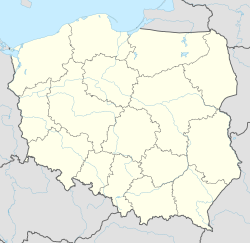Zagórzyce, Lower Silesian Voivodeship
Zagórzyce | |
|---|---|
Village | |
| Coordinates: 51°16′9″N 16°32′35″E / 51.26917°N 16.54306°E | |
| Country | |
| Voivodeship | Lower Silesian |
| County | Wołów |
| Gmina | Wołów |
| First mentioned | 1175 |
| Time zone | UTC+1 (CET) |
| • Summer (DST) | UTC+2 (CEST) |
| Vehicle registration | DWL |
| Voivodeship roads | |
Zagórzyce [zaɡuˈʐɨt͡sɛ] is a village in the administrative district of Gmina Wołów, within Wołów County, Lower Silesian Voivodeship, in south-western Poland.[1] It lies approximately 10 kilometres (6 mi) south-west of Wołów and 39 km (24 mi) north-west of the regional capital Wrocław.
History
[edit]The oldest known mention of the village come from a chronicle from 1175. In a document of Pope Innocent III issued in 1201 in Segni, the village was mentioned under the Latinized Polish name Zagorizs and confirmed as a possession of the monastery in nearby Lubiąż.[2] In a document of Bishop of Wrocław Wawrzyniec issued in 1217, the village appeared as Zagorici.[3] The name is of Polish origin and comes from the words za górami, which means "behind the hills".[4][5] Since the Middle Ages, it was part of Piast-ruled Poland, and later on, it was also part of Bohemia (Czechia), Prussia and Germany. During World War II, it was the location of a forced labour subcamp of the Nazi German prison for youth in Wołów.[6] In 1945, following Germany's defeat in World War II, the village became again part of Poland.
References
[edit]- ^ "Central Statistical Office (GUS) – TERYT (National Register of Territorial Land Apportionment Journal)" (in Polish). 2008-06-01.
- ^ Grünhagen, Colmar (1884). Codex Diplomaticus Silesiae (in German). Vol. 7. Josef Max & Comp. p. 65.
- ^ Grünhagen, p. 115-116
- ^ Damrot, Konstanty (1896). Die älteren Ortsnamen Schlesiens, ihre Entstehung und Bedeutung. Mit einem Anhange über die schlesisch-polnischen Personennamen. Beiträge zur schlesischen Geschichte und Volkskunde (in German). Verlag von Felix Kasprzyk. p. 138.
- ^ Adamy, Heinrich (1888). Die schlesischen Ortsnamen, ihre Entstehung und Bedeutung. Ein Bild aus der Vorzeit (in German). Verlag von Priebatsch's Buchhandlung. p. 19.
- ^ "Außenkommando des Jugendgefängnisses Wohlau in Birkenhain". Bundesarchiv.de (in German). Retrieved 3 June 2021.


